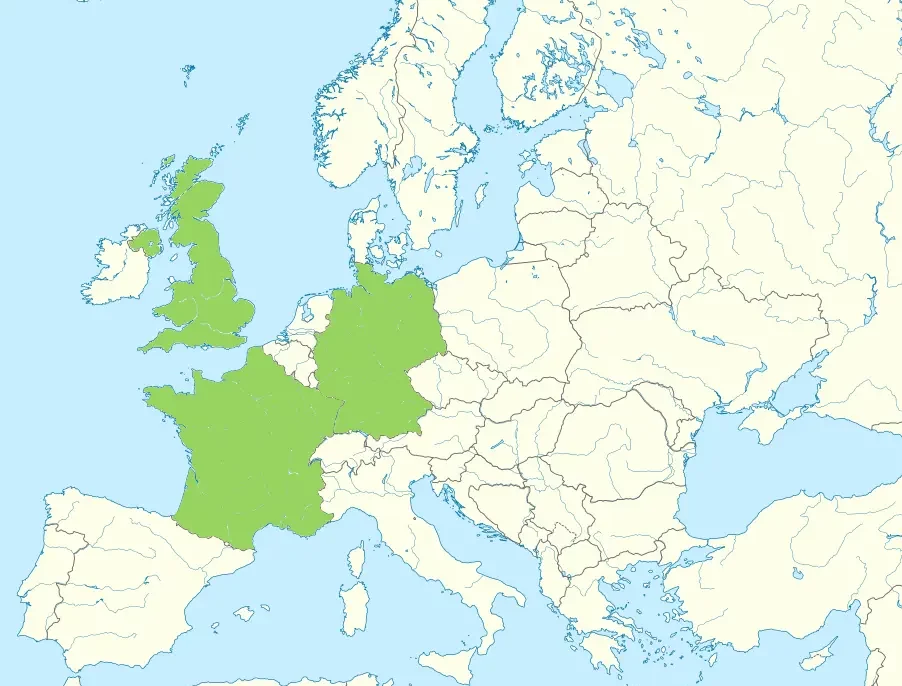In Europe, investment opportunities are incredibly diverse. Some countries attract investors due to their stable economies and popularity as tourist destinations, while others are appealing for their future potential, recovery from economical downturns, favorable regulatory environments for investments, or relatively low property prices.
Based on the criteria of Strong and Stable Economies, we have thoroughly examined which countries within Europe are worth considering for investors, and what are the outstanding factors that have earned certain countries a place on our list.

Germany
Germany boasts the largest economy in Europe along with growing cities, a stable political environment, and infrastructure. Its property prices are notably competitive compared to other European countries. Additionally, Germany provides a range of tax incentives to property investors, including deductions for depreciation and renovation costs, effectively reducing the investment burden. With high rental demand, particularly in urban hubs, the German government further supports property investment through initiatives like low-interest loans tailored for energy-efficient upgrades, thereby enhancing investment returns. Berlin, Hamburg, Frankfurt, Stuttgart, Munich, and Leipzig are the best areas to invest in.
- GDP (2023): €4,219 billion
- Population (2024): 83.3 million
- Rental Yields (2024): 3.74%
- Average Property Price for purchase: €3,148–4,738 per square meter
- Average Property Price for rent: €18–33 per square meter
Risks: In 2023, house prices experienced an 8.4% decline, marking the first annual decline since 2007. However, this dip follows significant growth of 30% in both 2019 and 2022, suggesting it’s more of a market correction than a collapse. Factors contributing to this correction include high financing expenses and increases in material and labor costs.
France
France, boasting Europe’s second-largest economy, a vibrant tourist industry, a rich cultural tapestry, and stunning landscapes. France attracts over 90 million tourists annually, generating significant demand for accommodation. This is particularly true in major cities like Paris, Lyon, and Marseille, where rental yields are exceptionally high. The French government actively encourages real estate investment, especially with a focus on energy-efficient renovations. They offer tax breaks that reduce investment costs and boost potential returns.
- GDP (2022): €2,591 billion
- Population (2024): 64.9 million
- Rental Yields (2024): 4.56% (average)
- Average Property Price for Purchase: €2,230-€3,640 per square meter (varies greatly by location)
- Average Property Price for Rent: €8-€27 per square meter
Risks: High property taxes, potential for rent control regulations in some cities, slower economic growth compared to Germany. Purchasing property in France involves various fees – around 7-10% of the property value – on top of the purchase price.
United Kingdom
The UK property market has benefited from consistent growth over the years, providing capital appreciation for investors. Rental income in the UK can be attractive, offering a steady stream of returns on your investment. The UK government actively supports property investment through various initiatives. These include tax breaks on mortgage interest payments and property depreciation, making buy-to-let investments more appealing. London, Manchester, Birmingham, Edinburgh, and Glasgow are well-established cities with significant investment potential.
- GDP (2023): €2,664 billion
- Population (2024): 67.9 million
- Rental Yields (2024): 4.75% (average)
- Average Property Price for Purchase: €1,987-€8,466 per square meter (varies greatly by location)
- Average Property Price for Rent: €12-€48 per square meter
Risks: Political and economic uncertainty due to Brexit, high property prices in prime locations, potential for stricter regulations on buy-to-let properties. Some experts have raised concerns about potential overheating in certain segments of the UK property market, particularly in London. This could lead to a price bubble, which could burst in the future, resulting in losses for investors.


